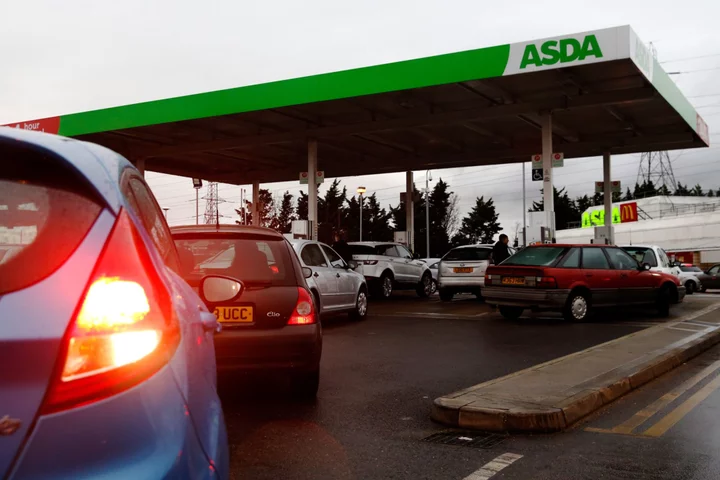Fuel used to be the biggest bargain at Britain’s supermarkets. Today, some drivers are convinced it’s the biggest ripoff.
Profit margin targets on fuel at Asda, the UK’s third-largest supermarket, have tripled in the past three years, upending the grocer’s decades-long reputation for aggressively lowering prices at the pump. Margin targets at smaller rival Morrisons have nearly doubled over the same period, according to Britain’s antitrust regulator.
The higher costs have angered both politicians and the Competition and Markets Authority. It estimates that when you throw in increases at Britain’s biggest supermarket operators — Tesco Plc and J Sainsbury Plc — motorists have paid an extra £900 million ($1.2 billion) on fuel during the worst cost-of-living crisis in decades.
“They jacked up their prices when fuel costs rocketed but failed to pass on savings now costs have fallen,” Energy Secretary Grant Shapps said earlier this month, accusing retailers of using motorists as “cash cows.”
Yet supermarket bosses say overall operating profits have plunged over the same period — falling more than 41% across the industry last year alone — as they focused on keeping groceries affordable during the inflationary spiral. As political pressure to lower fuel prices mounts and food inflation remains stubbornly high, a country long hooked on both cheap food and fuel faces a reckoning.
In the past, “we were using fuel as an industry to drive customers to our supermarkets,” Simon Roberts, Sainsbury’s chief executive officer, told analysts on a July 4 call. Now, grocers have been “prioritizing value in food rather than offering promotions in fuel,” he said.
That explanation provides little comfort to UK motorists suffering sticker shock. Overall, margins at grocers’ pumps have doubled just since the start of the war in Ukraine, jumping to 10 pence per liter from 5p, according to data released Saturday by RAC Ltd.
“These bloated margins must make difficult reading for the millions of drivers who are already battling the rising cost of living,” said Simon Williams, fuel spokesman at RAC, a roadside assistance company.
Britain’s regulator says it’s also been easier for grocers to keep petrol margins higher as Asda and Morrisons, both taken over by private equity firms in recent years, are no longer competing as fiercely on price as they once did.
Asda’s role in keeping UK fuel prices low goes back decades. Tony Page, the board member responsible for non-food retail at Asda in the late 1990s and early 2000s, said the battle to prove they were the cheapest on fuel was so fierce that the company would send out a press release each time they lowered the price.
“Petrol was iconic because it was displayed on massive great boards,” Page said. “It was the last thing you’d want to be out of line on. It would be a disaster.”
Not any longer. “Asda told us that they saw an opportunity to deliberately feather prices on fuel as they came down from the peak,” said Dan Turnbull, director of markets at the CMA.
In a bruising run-in with a parliamentary committee on Wednesday, Mohsin Issa, the co-owner of Asda, rejected accusations the grocer had been slow to lower diesel prices in order to pad its profits. “Our strategy has not changed,” Issa said. “We remain the price leader on fuel.”
A Morrisons representative declined to comment on its margins.
Filling the tank at UK supermarkets has traditionally been much cheaper than at oil companies’ petrol stations, and remains less expensive now, even as margins have grown. Howard Cox, founder of campaign group FairFuelUK, said big grocers can offer lower prices because they tend to buy in large volumes directly from refineries, cutting out the middlemen. “I firmly blame supermarkets now for fleecing drivers as much as they can,” he said.
Read More: Asda Boss Grilled By UK Politicians Over Rising Fuel Prices
While fuel margins have surged, the same can’t be said for food. The CMA said Thursday it found no evidence that weak competition was leading to faster food inflation. A recent survey from Oxford Economics found UK food costs were about 7% cheaper than the European Union average.
When questioned by British politicians, all the supermarket leaders said that keeping food affordable during an inflationary crisis that has decimated many household budgets is the main priority for them and their customers.
“Fuel stunts were a very common approach in the industry” not so long ago, Sainsbury’s Roberts said on the analyst call, referring to promotions. “We’re now putting all of our energy and focus into having the best value in food.”

